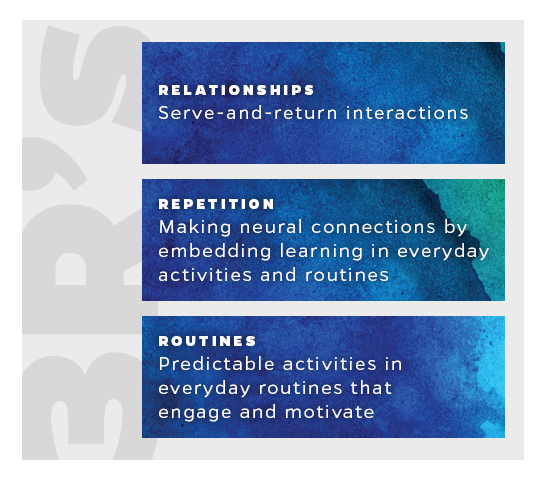A to Z’s of Early Childhood
The Science of Child Development and Learning
3R’s of Early Learning: Relationships, Repetition, Routines ™
Our focus areas for generating knowledge are subsumed under the framework known as the 3R’s of Early Learning: Relationships, Repetition, Routines ™. The 3R’s are three important processes that shape children’s health, development, learning, and well-being. The 3R’s of Early Learning are important because they focus on how, with whom, when and where children learn, in addition to what they learn.

Relationships.
Nurturing and responsive relationships are the foundation for healthy development and early learning. From the time they are born, children have thousands of interactions each day with their caregivers, other family members and other adults in their lives such as practitioners in early education and care programs. Toddlers and preschoolers also have many interactions with other children. When children have consistent and positive interactions with others, they are experiencing relationships that support their brain development and their learning.
Repetition.
Children benefit from repeated opportunities to learn. For example, hearing a caregiver use a word repeatedly or having many opportunities to crawl toward a favorite toy or person helps children learn new skills or master ones they have learned. Some children might need more repetition or practice than others. For all children, repeated learning opportunities within everyday routines help build connections in the brain that advance development and learning.
Routines.
Relationships and repetitions should occur in the context of everyday routines and activities. Routines are predictable and often have several steps (e.g., changing a diaper). Activities can occur within a routine (e.g., playing a game of peek-a-boo during a diaper change) or they can stand alone (e.g., painting at an easel with a friend). Everyday routines and activities provide opportunities for children to practice skills or learn new skills when and where they are meaningful and useful. Some routines and activities happen at home, while others happen in the community or in early education and care programs. Many happen in more than one place, so children have repeated opportunities to engage in nurturing and responsive relationships. This also means they have repeated opportunities to practice skills in different places and with different people or with different toys or materials.
Receive Additional Support
The 3R’s of Early Learning videos are essential teaching components of our consultative training and technical assistance.
If you would like to contact our center to learn more about our consultative training or technical assistance (which includes access to a physical copy of our growing library of 3R’s of Early Learning videos), please complete this contact form.
Remember, the 3R’s of Early Learning: Relationships, Repetition, Routines ™ are the foundation for supporting development and early learning.
